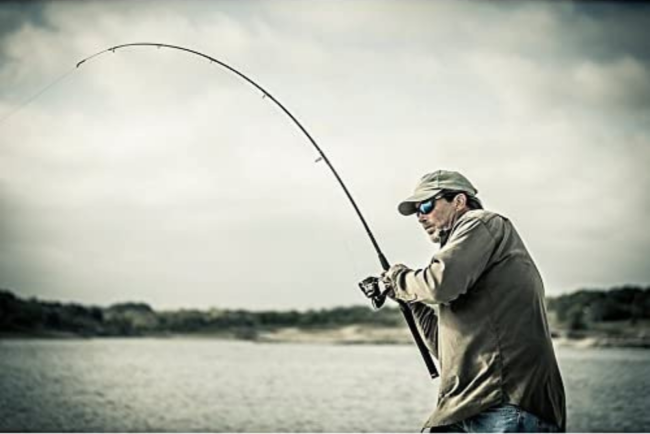Photo: amazon.com
Buying a fishing rod takes a lot of thought. Rods come in a variety of materials and lengths, ranging in strength and flexibility to suit different types of fishing. There are so many options that it can be challenging for the uninitiated to pick the best fishing rod.
From simple cane poles to high-end graphite models, this guide will tell you what features to consider when shopping for the best fishing rod. Read on to learn about the workings of fishing rods and why the models below are top performers.
- BEST OVERALL: UglyStik GX2 Spinning Fishing Rod
- BEST BANG FOR THE BUCK: Sougayilang Rod Combos with Telescopic Fishing Pole
- BEST UPGRADE: Ugly Stik Tiger Elite Spinning Fishing Rod
- BEST TELESCOPIC: PLUSINNO Carbon Fiber Telescopic Fishing Rod and Reel
- BEST FOR BASS FISHING: CadenceCarbon Casting and Ultralight Fishing Rod
- BEST TRAVEL: Eagle Claw Pack-It Telescopic Spinning Rod
- BEST FOR ICE FISHING: Berkeley Cherrywood Ice Fishing Spinning Combo
- BEST GRAPHITE: KastKing Perigee II Fishing Rod
- BEST BAMBOO: BambooMN Bamboo Vintage Cane Fishing Pole

Photo: amazon.com
Types of Fishing Rods
Ahead we’ll cover the three main fishing rod types—graphite, fiberglass, and bamboo—each of which has unique characteristics.
Graphite
Graphite rods are strong, stiff, and lightweight. That stiffness makes graphite rods very sensitive, so anglers can feel fish nibbling on the line, but that stiffness can also make the rods brittle. Graphite rods are strong and can handle heavy fish as well as hefty rigs, lures, and bait.
Fiberglass
Fiberglass rods are heavier than graphite but more flexible and less brittle, so they are very durable. Fiberglass rods are cheaper than graphite rods as well, making them a good option for novice anglers. They are good for fishing with smaller flies, nymphs, and lightweight rigs.
Bamboo
Bamboo rods are the simplest and most old school of fishing gear. Bamboo is strong and flexible. Bamboo rods are popular fly fishing rods. Good split bamboo rods require precision construction and are more expensive.
What to Consider When Choosing the Best Fishing Rod
Rod length, action, and power are just a few of the factors to take into account when selecting the best fishing rod for you.
Rod Length & Casting
When it comes to rod length, the general rule is the longer the rod, the longer the cast. Rods vary in size from 2-feet ice fishing rods for dropping a line through a hole in a frozen lake, to 14-feet surf rods that can cast lines 100 yards or more from the shore.
Shorter rods are good for making short and accurate casts and work well for trolling or fishing from a boat. Longer rods allow for greater casting distance, so they’re good for fishermen fishing in the ocean surf. They’re also good for anglers looking to “walk” baits, which involves casting the line out, then reeling it back in slowly to simulate the movement of an insect or small fish.
Power
The length, construction, and flexibility (action) of a rod factor into its power. Power is a measure of how much force a rod can handle, and it’s categorized as ultralight, light, medium, heavy, and extra heavy. Power also plays a role in casting distance and the weight of fish you can pull in.
Generally, light rods are good for catching small fish because the rod’s sensitivity helps you set the hook in their small mouths. Heavy rods are best suited for weighty jigs and lures and big fish, as they allow you to set a hook in their large mouths and haul them in. Medium power rods offer versatility, enabling you to fish for different size fish with many types of lures and bait.
Action
Action refers to how much a rod bends when pressure is applied to the tip. A rod can have slow, moderate, fast, and extra-fast action.
A slow rod bends along its entire length, while a fast rod bends just at the tip. Slow action rods are used for smaller fish, and moderate action rods are best for anglers who need to move lures through the water to attract fish. Fast action rods work best for heavier fish that need a hook set quickly and powerfully.
Handle
Most fishing rods have either a cork or foam handle. While foam handles feel good on your hands, they can become slippery when wet. Cork handles aren’t as comfy on the hands but are more water resistant and easier to hang on to.
Handles also come in a variety of lengths. Longer handles allow two-handed casts that get a lure farther out in the water. Shorter handles allow for shorter, one-handed casts that are more accurate. Some rods have pistol grips for more precise casts.
Rod Guides & Rings
Fishing rods have a series of rings or guides from the reel to the tip. The fishing line runs through the rings, which decrease in diameter as they get closer to the tip. The largest ring near the reel allows for the circular motion of the line when you’re cranking it in. The narrow ring at the tip helps with accurate casting.
The best fishing rods have rings with smooth interiors made of ceramic or silicone that don’t wear on the line. Cheaper rods have aluminum rings that can create friction on the line and make it snap when you’re reeling in a catch.
Our Top Picks
With those shopping considerations in mind, the recommendations below are among the best fishing rods in their respective categories.

Photo: amazon.com
The UglyStik has been around since the 1970s and is a great all-around fishing rod at a moderate price. This hybrid model is made of fiberglass and graphite for an excellent balance of sensitivity and strength, so it can handle everything from little trout to big salmon.
Its fiberglass tip won’t let you easily manipulate lures, but it has enough play that you also won’t lose small fish by yanking the hook from their mouths. This makes it a forgiving rod for novice anglers who tend to jerk the line when they feel a bite. Its stainless steel guides can take a beating without crumpling. The GX2 comes in ultralight, medium, medium-heavy and heavy versions, in lengths ranging from 5 to 9 feet.

Photo: amazon.com
This rod comes with the essential gear for fishing: a telescopic fishing rod, reel, line, and fishing lures. For newbies who aren’t ready to spend a lot of money on gear, it’s priced affordably, too. The carbon-fiber and fiberglass rod is strong and has plenty of action, suitable for catching various sport fish, including salmon, bass, and trout.
Porcelain guide rings prevent friction that can cause line breakage. The rod comes in lengths from 6 to 8 feet, with each model collapsing to less than 17 inches long for easy transport in the included carry case.

Photo: amazon.com
The Ugly Stik Elite is a stiff rod that’s a good pick for fishing with spinning lures. It has a sturdy graphite-blend construction to give it power and durability, stainless steel guides, and a high-density foam handle for a comfy grip even when the rod is wet.
With its sensitive tip, you’ll feel even tiny nibbles on the line, but it’s strong enough to haul in fish weighing 50 pounds or more. The Ugly Stik Tiger Elite comes in medium, medium-heavy, and heavy power options with lengths ranging from 6 feet 6 inches to 7 feet.

Photo: amazon.com
Carrying around a fishing rod can be awkward, especially if you’re backpacking to your fishing location or on a small boat. PLUSINNO’s 6-feet-9-inch fishing rod is easy to stow, due to its collapsibility to a manageable size of just 9 inches long. This rod is made of a durable carbon-fiber and fiberglass mix and has medium power, so it’s a versatile rod that can be used for a range of fishing.
This telescoping rod is lengthy enough for long casts, so you can use it from the shore or from a boat. This rod comes as a kit that includes a reel, fishing line, fishing lures, and hooks. Store your fresh catch in a cooler and this fishing rod in its included carrying bag.

Photo: amazon.com
Cadence uses carbon to make a graphite rod that’s both lightweight and ultrasensitive, so it’s an excellent option for bass fishing. It has a stainless steel Fuji reel seat and comes in two handle configurations—split carbon grip and a full cork grip—so you can get a comfortable handhold while fighting strong fish.
Stainless steel guides with silicone carbide inserts lessen friction on the lines, preventing breakage. This rod comes in lengths ranging from 4 feet 8 inches to 7 feet.

Photo: amazon.com
Fishing rods can be awkward to carry and travel with. The Eagle Claw 5-feet 6-inch telescopic rod collapses to just 18 inches long, allowing you to stash it in a backpack, suitcase, or the trunk of a car.
It has plenty of whippy action thanks to its all fiberglass construction. A foam handle makes wielding this rod comfortable, while smooth ceramic guides prevent line breaks when battling larger fish.

Photo: amazon.com
Berkeley’s rod is suited to the demands of ice fishing, thanks to its short length and fiberglass construction. It’s made for you to drop a line into a hole in the ice and reel in a big fish. The rod has a cork handle that is easy to hold onto in freezing temperatures and large, stainless steel guides that reduce friction when you’re battling a fish.
This rod is stout enough to handle large trout but has enough sensitivity to catch smaller fish. Graphite reel seats keep the reel (included) attached to the rod. The Berkeley comes in three models: 24-inch ultralight power, 27-inch light power, and 30-inch medium power.

Photo: amazon.com
The Kastking Perigee II comes in a range of power options, including ultralight, light, medium, medium-heavy, and heavy as well as action ranges, from moderate to fast. It’s one of the most versatile models you can attach to a reel and is well suited for both saltwater and freshwater use.
Its high-density foam handle keeps your comfy while reeling in big fish. At the core of this rod is a carbon and graphite blank, which gives it lots of strength and power, ensuring the big one won’t get away. It also won’t cut your line, thanks to its smooth silicone Fuji O-ring line guides.

Photo: amazon.com
Bamboo poles are a great option for those learning to fish or those who seek the simplicity of fishing without a reel and long lines. This stout bamboo pole features a two-piece design, making it easy to tote. It’s 6 feet long when fully assembled, suitable for fishing in smaller bodies of water.
This rod is strong enough to pull in a large catch. It comes with a bobber, hook, sinker, and line, so you have the essentials to get started. This pole comes in three lengths: 6 feet, 12.5 feet, and 14.2 feet.
FAQs About Fishing Rods
If you’re still wondering how to choose the best fishing rods, read on for more information.
Is a medium or heavy rod better?
It depends on the type of fishing you are doing. Heavy rods are best for use with spinner baits, which mimic real fish and insects but add significant drag to the line. A light or medium rod with slow action will bend too much under the lure’s drag to pull it through the water effectively. For most purposes, a medium rod gives you the most versatility by allowing you to fish with a range of lures.
What is an extra-fast rod good for?
Extra-fast rods have more sensitivity at the tip and more power. This type of rod works well for single hooks and jigs. The rod’s sensitivity allows the angler to feel fish strikes more quickly, while its fast action helps the angler set the hook into the fish’s mouth.
How long should my fishing rod be?
It depends on the type of fishing you are doing. If you want short, accurate casts, go with a rod that is 6 feet long or less. If accuracy isn’t an issue and you are going for distance in your casts, go for a rod that’s 7 feet long or more.
Credit: Source link






























